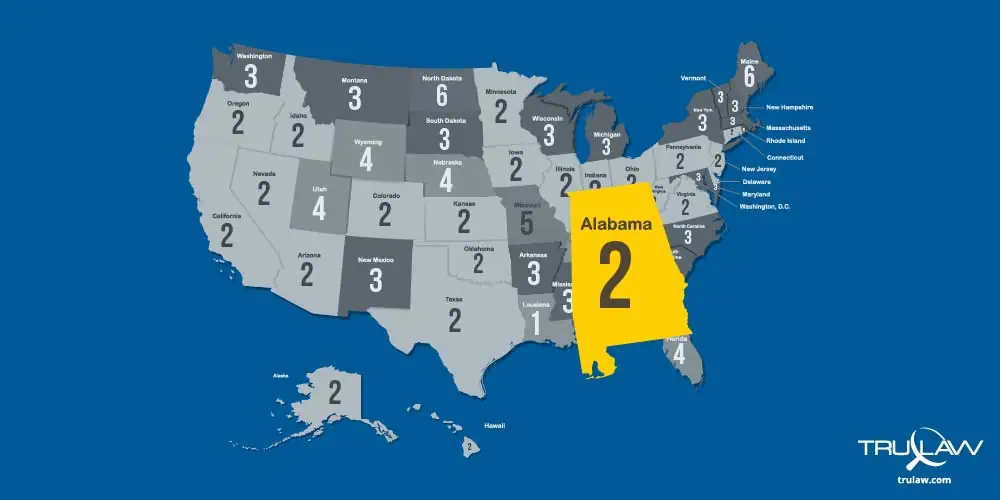Alabama Statute of Limitations
- Last Updated: July 12th, 2023

Attorney Jessica Paluch-Hoerman, founder of TruLaw, has over 28 years of experience as a personal injury and mass tort attorney, and previously worked as an international tax attorney at Deloitte. Jessie collaborates with attorneys nationwide — enabling her to share reliable, up-to-date legal information with our readers.
Legally Reviewed
This article has been written and reviewed for legal accuracy and clarity by the team of writers and legal experts at TruLaw and is as accurate as possible. This content should not be taken as legal advice from an attorney. If you would like to learn more about our owner and experienced injury lawyer, Jessie Paluch, you can do so here.
Fact-Checked
TruLaw does everything possible to make sure the information in this article is up to date and accurate. If you need specific legal advice about your case, contact us by using the chat on the bottom of this page. This article should not be taken as advice from an attorney.
What Are Statutes of Limitations?

In each state, a statute of limitation simply defines the time-period in which the claimant may file a lawsuit.
The time period varies from state to state and thus, will depend on which state you declare residency in.
An attempt at filing a claim may be affected by several factors, such as the date at which you discover your injury and if death resulted from one’s injury.
Table of Contents
Alabama Statute of Limitations

In the state of Alabama, the statute of limitations for personal injury is 2 years from the date of injury.
In general, this means that all personal claims against the negligent party must be filed within 2 years from the date of injury.
Personal Injury Claims
A personal injury is any injury you sustain due to the negligent or reckless behavior of another party.
If you are attempting to file a claim in the state of Alabama, the statute of limitations for personal injury is 2 years.
This means that all personal claims against the party must be filed within 2 years from the date upon which the injury was inflicted.
Examples:
- Car Accidents
- Truck Accidents
- Nursing Home Abuse
- Medical Malpractice
- Slip and Fall
- Products Liability
- Wrongful Death
- Motorcycle Accidents
- Bicycle Accidents
- Workers’ Compensation
- Asbestos / Mesothelioma
- Barge Accidents / FELA
- Railroad Accidents / FELA
- Boating Accidents
- Swimming Pool Accidents
- Birth Injuries
- Civil Rights / Violations by Police
- Pharmaceutical Cases
Wrongful Death Claims
If the injured party dies as a result of the injury, a wrongful death lawsuit may be appropriate.
In the state of Alabama, the family (or beneficiary of the estate) has 2 years to file a wrongful death claim.
Product Liability Claims
Every state has a statute of limitations that applies specifically to defective product liability claims, this limitation often applies to drugs and medical device cases that have inflicted injury upon one’s body from consumption of a drug or implantation of a medical device.
In this case, if you are attempting to file a claim in the State of Alabama, the statute of limitations for a product liability action is 1 year from the date of injury.
What Is The Discovery Rule?
In cases when a plaintiff may not know they have been a victim of negligence for months or even years, most states employ what is commonly known as the discovery rule.
The discovery rule suspends the statute of limitations until an injury is or should have been discovered.
In the state of Alabama, the discovery rule is 1 year.
Punitive Damages
In addition to actual damages, “punitive damages” can be awarded to injured individuals.
Punitive damages are intended to reform or deter the defendant and others from engaging in conduct similar to that which formed the basis of the lawsuit, while also providing financial compensation for the injured victim.
In recent years, many states passed laws placing a “cap” on punitive damages as a result of insurance industry lobbyists.
The state of Alabama requires “clear and convincing evidence that the defendant deliberately engaged in oppression, fraud, wantonness or malice” before punitive damages are awarded.
And, even after meeting the burden of proof, the state of Alabama limits punitive damages to $500,000.00 or three times the compensatory damages (the monetary amount necessary to replace what was lost to the victim)—whichever is greater.
Alabama Statute Of Repose
A statute of repose is even stricter than a statute of limitations and is, therefore, a favorite defense in lawsuits against the manufacturer of defective drugs and medical devices.
A statute of repose takes effect when an action is complete, which can happen even before an individual is harmed, cutting off the right for a lawsuit before injury occurs.
Examples of statutes of repose dates used in defective drug and device cases include the date the product was made, sold or even delivered.
In Alabama, there is no statute of repose.
Filing A Claim In The State Of Alabama
Due to the fact that there are specific time limits to file a claim in the state of Alabama, we think it’s an important step to speak with someone who can help you sort out all the details of your potential lawsuit.
Contact TruLaw to discuss your case with one of our experienced attorneys.

Managing Attorney & Owner
With over 25 years of legal experience, Jessica Paluch-Hoerman is an Illinois lawyer, a CPA, and a mother of three. She spent the first decade of her career working as an international tax attorney at Deloitte.
In 2009, Jessie co-founded her own law firm with her husband – which has scaled to over 30 employees since its conception.
In 2016, Jessie founded TruLaw, which allows her to collaborate with attorneys and legal experts across the United States on a daily basis. This hypervaluable network of experts is what enables her to share the most reliable, accurate, and up-to-date legal information with our readers!
Here, at TruLaw, we’re committed to helping victims get the justice they deserve.
Alongside our partner law firms, we have successfully collected over $3 Billion in verdicts and settlements on behalf of injured individuals.
Would you like our help?
At TruLaw, we fiercely combat corporations that endanger individuals’ well-being. If you’ve suffered injuries and believe these well-funded entities should be held accountable, we’re here for you.
With TruLaw, you gain access to successful and seasoned lawyers who maximize your chances of success. Our lawyers invest in you—they do not receive a dime until your lawsuit reaches a successful resolution!
AFFF Lawsuit claims are being filed against manufacturers of aqueous film-forming foam (AFFF), commonly used in firefighting.
Claims allege that companies such as 3M, DuPont, and Tyco Fire Products failed to adequately warn users about the potential dangers of AFFF exposure — including increased risks of various cancers and diseases.
Depo Provera Lawsuit claims are being filed by individuals who allege they developed meningioma (a type of brain tumor) after receiving Depo-Provera birth control injections.
A 2024 study found that women using Depo-Provera for at least 1 year are five times more likely to develop meningioma brain tumors compared to those not using the drug.
Suboxone Tooth Decay Lawsuit claims are being filed against Indivior, the manufacturer of Suboxone, a medication used to treat opioid addiction.
Claims allege that Indivior failed to adequately warn users about the potential dangers of severe tooth decay and dental injuries associated with Suboxone’s sublingual film version.
Social Media Harm Lawsuits are being filed against social media companies for allegedly causing mental health issues in children and teens.
Claims allege that companies like Meta, Google, ByteDance, and Snap designed addictive platforms that led to anxiety, depression, and other mental health issues without adequately warning users or parents.
Transvaginal Mesh Lawsuits are being filed against manufacturers of transvaginal mesh products used to treat pelvic organ prolapse (POP) and stress urinary incontinence (SUI).
Claims allege that companies like Ethicon, C.R. Bard, and Boston Scientific failed to adequately warn about potential dangers — including erosion, pain, and infection.
Bair Hugger Warming Blanket Lawsuits involve claims against 3M — alleging their surgical warming blankets caused severe infections and complications (particularly in hip and knee replacement surgeries).
Plaintiffs claim 3M failed to warn about potential risks — despite knowing about increased risk of deep joint infections since 2011.
Baby Formula NEC Lawsuit claims are being filed against manufacturers of cow’s milk-based baby formula products.
Claims allege that companies like Abbott Laboratories (Similac) and Mead Johnson & Company (Enfamil) failed to warn about the increased risk of necrotizing enterocolitis (NEC) in premature infants.
Here, at TruLaw, we’re committed to helping victims get the justice they deserve.
Alongside our partner law firms, we have successfully collected over $3 Billion in verdicts and settlements on behalf of injured individuals.
Would you like our help?












